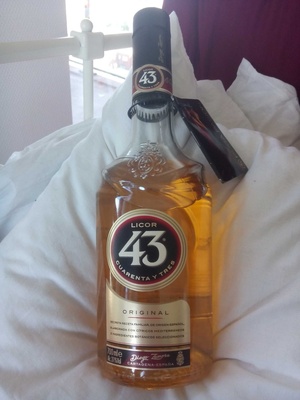
Barcode: 8410221110150
Licor 43
HARAM
📝 Reason: The identified Haram substances in this product originate from impermissible sources that violate established Islamic dietary regulations and ethical standards.
🏷️ Category: Beverages And Beverages Preparations, Beverages, Alcoholic Beverages, Liqueurs
📄 Certificates: Contains Alcohol, Green Dot
Ingredients:
Details
Understanding the Halal Status of Licor 43
Licor 43 is a well-known Spanish liqueur famous for its unique blend of flavors and sweetness. However, for those adhering to Islamic dietary laws, the Halal status of this beverage raises significant concerns. In this post, we’ll dissect the ingredients of Licor 43 to understand why it is classified as Haram.
The Halal Verdict: Why Licor 43 is Haram
The primary reason Licor 43 is considered Haram revolves around the presence of alcohol in its composition. Alcohol is explicitly prohibited in Islam as it alters the mind and leads to behavior that is not permitted under Islamic law. Despite the allure of its flavors and the cultural significance, it is crucial for Muslims to avoid products containing alcohol.
Ingredients Breakdown
Licor 43 contains several ingredients, including:
- Sugar: This ingredient is permissible in Islam and is widely used as a sweetener in various foods and beverages.
- Water: Another Halal component that forms the base of many drinks.
- Alcohol: This is the principal haram ingredient, sourced from fermentation processes that Muslims are forbidden to consume.
- Aromas: These are typically permissible, provided they don’t derive from Haram sources.
- Citric Acid: Used as an acidifying agent, citric acid is derived from citrus fruits and is Halal.
- Colorants E102 and E110: Both are food colorings. E102 (Tartrazine) is synthetic and can be Halal, while E110 (Sunset Yellow) similarly depends on the source but is typically regarded as permissible.
Diving Deeper into E-Numbers
Let’s analyze the E-numbers present in Licor 43:
- E102 (Tartrazine): A synthetic dye which is often used to provide a vibrant yellow color. It’s essential to check its source, but it is widely accepted as Halal.
- E110 (Sunset Yellow): Another colorant that, similar to E102, is synthetic. It’s also essential to verify that it doesn’t contain any haram components, though it is generally accepted in Halal standards.
Contextual Understanding
Licor 43 falls under the category of alcoholic beverages and liqueurs, which by their nature can be problematic for those observing Halal guidelines. It is crucial for Muslims to be vigilant about such products. This beverage might be popular for its flavor profile, but due to the alcohol content and its classification, it is essential to understand and acknowledge the reasons behind its Haram status.
Conclusion: Making Informed Choices
While Licor 43 offers a delightful experience for many, it poses significant concerns for the Muslim community due to its inclusion of alcohol. For anyone seeking to maintain their dietary practices in adherence with Islamic law, it is advisable to steer clear of this beverage and opt for Halal-certified alternatives. Understanding the ingredients and their implications not only informs better dietary choices but also aligns one’s consumption with personal beliefs and ethical standards.
In conclusion, always review product labels and be aware of the contents, especially when it comes to beverages that can influence lifestyle and dietary habits. Your health and spiritual well-being are paramount, and being informed will lead to better choices.
